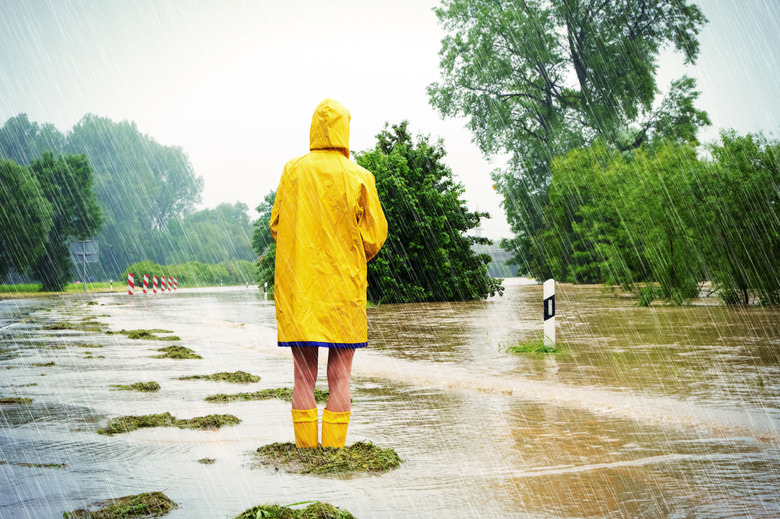How Climate Change Could Affect Your Health
Between withdrawing from the Paris climate agreement to sky-high temperatures in the southwest – hot enough to keep planes grounded in Phoenix – climate change is dominating the headlines recently. And as state and local governments throughout the U.S. start to develop new strategies to deal with the effects of climate change, one angle remains relatively under-discussed: how the climate changing can affect our health.
The truth is that, while climates have shifted multiple times throughout the earth's history, these shifts often have less-than-optimal effects on the species living on Earth at the time. Unfortunately, we're no exception. Read on to learn about how climate change might affect your health, and how to do your part to fight it.
One of the most direct risks of an ever-heating planet is a greater chance of developing heat-related illness. Heat illness develops when your body's natural temperature controls, like sweating, can't cool you fast enough. The excess heat means the enzymes that make your tissues function properly aren't able to function as efficiently – and, in extreme cases, the heat can make your tissues shut down.
Rising temps, not surprisingly, mean more intense and sustained heat waves that increase your risk of heat-related illness. And high rates of cardiovascular disease and obesity – two risk factors for heat illness – among Americans mean those in the U.S. may be particularly at risk.
Greater Transmission of Infectious Diseases
Changes in the climate mean changes in local ecosystems around the world – and some of those changes can have dangerous consequences when it comes to the rate of infectious disease. Warmer-than-average winters, for instance, mean higher rates of mosquito breeding and survival, notes the World Health Organization (WHO). And because mosquitos can carry dangerous infections, including malaria and the zika virus, better survival also means more opportunity to spread disease.
Climate change-induced changes to forests can mean forest-dwelling bugs like ticks can survive in new areas, bringing with them higher rates of lyme disease. And projected changes in population distribution causing urban crowding could up the risk of cholera, reports WHO.
Higher Rates of Cancer
You probably don't think of cancer as linked to climate change, but effects of extreme weather patterns may increase your cancer risk, explains the National Institute of Environmental Health Sciences. Heavy rainfall and flooding can increase your exposure to carcinogenic compounds, and higher temps mean that more of those chemicals can evaporate into the air – and make their way into your lungs.
Higher levels of air pollution increase your cancer risk, as well, while stronger ultraviolet rays from the depletion of the ozone layer could increase your risk of sun exposure-related cancers, like skin cancer.
Dangerous Extreme Weather Events
You've probably already noticed an increase in extreme weather events – whether they're storm surges on coastal cities or deadlier-than-average tornado seasons. Extreme weather events pose a major public health risk, since they can both directly injure or kill people, but also cripple infrastructure needed to deliver health care. impacts/weatherrelated_morbidity/index.cfm'>The National Institute of Environmental Health Sciences also notes that climate change contributes to droughts, which can impact our food supply.
Combating Climate Change at Home
Climate change is a global problem that requires a multi-tiered solution – but you can do your share by reducing your carbon footprint at home. Follow the three R's – reduce, reuse and recycle – and opt for energy-efficient appliances whenever you can. Organize locally to keep your community clean and green – that could be as simple as participating in a park clean-up or petitioning your local government to add water fountains to busy areas to reduce the need for bottled water. And contact your state and federal representatives to make sure they know combating climate change is important to you, so they can fight for environmentally friendly legislation to help the planet.
Cite This Article
MLA
Tremblay, Sylvie. "How Climate Change Could Affect Your Health" sciencing.com, https://www.sciencing.com/how-climate-change-could-affect-your-health-13400298/. 27 June 2017.
APA
Tremblay, Sylvie. (2017, June 27). How Climate Change Could Affect Your Health. sciencing.com. Retrieved from https://www.sciencing.com/how-climate-change-could-affect-your-health-13400298/
Chicago
Tremblay, Sylvie. How Climate Change Could Affect Your Health last modified March 24, 2022. https://www.sciencing.com/how-climate-change-could-affect-your-health-13400298/
